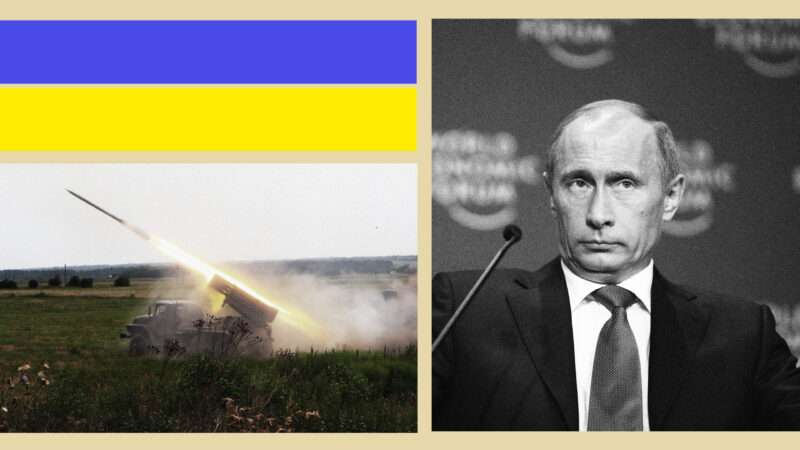
The six-month anniversary of Russia’s invasion of Ukraine is a miserable milestone few expected to reach. Early forecasts anticipated something more like six days, but half a year in, this historically bloody conflict seems nowhere near over. At summer’s end, battle lines remain roughly where they were at the beginning, and diplomatic resolution appears a distant possibility. Ukraine and Russia alike have settled in for the long haul, and so too has Washington, where a robust stream of military aid to Ukraine has lately pivoted “to a longer-term strategy to equip Ukraine to fight”—God forbid—”for years to come.”
The nature of U.S. involvement has been a compelling question throughout this war. America has spent decades blurring the lines between war and not-war in our foreign policy, so much so, I’ve argued, that it’s difficult to say if we’re “at war” in Ukraine already. Certainly, Russia says we are, and it’s hard to imagine we’d disagree were positions reversed. If Moscow helped another country kill American generals and sink our prize warships, surely we’d pursue reprisal?
And that’s the strange thing about Ukraine: The Russian regime accuses Washington of waging a proxy war, and you don’t have to concede a whit of moral high ground to the Kremlin to recognize that’s at least partly true. After all, Secretary of Defense Lloyd Austin has explicitly said Washington wants Russia to come out of this conflict “weakened,” an aim more ambitious than simply helping Kyiv repel Moscow’s unjust aggression.
But for all the accusations, there’s been no military reprisal. Indeed, so far, there are almost no consequences at all for U.S. military involvement in Ukraine. We’ve had high fuel prices all summer, but that’s more directly the result of Western sanctions against Russia than any Russian policy. Anticipated cyberattacks so far haven’t materialized (or, at least, haven’t been disclosed), and perhaps they aren’t coming at all. American athlete Brittney Griner is facing a grossly disproportionate sentence in Russia over a drug conviction, the timing of which suggests a Ukraine connection. But, without minimizing Griner’s ordeal, if this is the extent of Russian retaliation for U.S. facilitation of its battlefield humiliations, we’re getting off scot-free.
That’s a risky lesson for Washington to learn. Obviously, no one wishes for Russian reprisal. It’s good that U.S. intervention so far has not led to the military escalation many feared. It’s good we are not suffering a NATO-Russia nuclear war. It’s good that there’s a gap between Moscow’s accusations and its actions.
But even if you think Washington is doing the right thing in this case (current polling shows a bipartisan majority of Americans believe the U.S. should support Ukraine “until all Russian forces are withdrawn,” and only two in 10 disagree), there is an undeniable risk in teaching our government that it can wage proxy wars, including against fellow nuclear powers, without fear of significant consequence. Even with all possible caveats, even noting that this was not a war of our initiation, even recognizing the comparative moral clarity of this fight, that risk remains.
The risk is that what has happened here will not always happen in the future. It might not continue to happen in this very war, though the revealed weakness of the Russian military is a strong reason for expecting more of the same. Yet in another fight, against a different enemy—and proxy war with China over Taiwan is the obvious scenario to consider right now—we may not be so lucky.
This might seem like a point that doesn’t have to be made. But given the long dominance of U.S. military might and our multi-decade proclivity toward playing world police, I think it does. Being the global hegemon is a uniquely deceptive position: It can lure you into falsely believing you can do whatever you want.
Often our hegemony means great security. U.S. deterrence capabilities are remarkable and reliable, especially against state actors. Washington is frequently able to compel other governments to do its bidding.
Still, that power is not infinite, as the last 20 years of U.S. floundering in the greater Middle East made all too clear. Deterrence is not absolute, particularly when dealing with fellow great powers with whom we might fight a proxy war. Sometimes another country’s self-perceived national interest will outweigh the restraint imposed by the prospect of U.S. opposition. Sometimes, when another government accuses us of being functionally at war with them, they will respond in kind, with military action of their own.
In short, we can’t assume the pattern we now see in Ukraine will hold. If we do, it will dangerously misinform U.S. foreign policy. In the worst case, it could lead us toward civilization-ending war.
The post Washington Is Learning the Wrong Foreign Policy Lesson in Ukraine appeared first on Reason.com.
from Latest https://ift.tt/plNskU9
via IFTTT